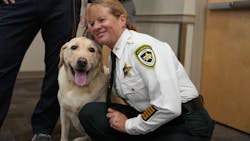Power of the Dog: Emotional Support Dogs in Law Enforcement
Since September, Greg Wells has enjoyed starting the week with a new routine. He checks online with the Hillsborough County Sheriff’s Office for Mason Mondays.
Thanks to this weekly feature on the Florida agency’s social media accounts, Wells is able to see what Mason Star—the department’s new emotional support Labrador retriever—has been up to. As manager of K9s for Warriors, an organization that outfits veterans with service dogs, Wells has a strong connection with Mason, who he helped train and place in his new career in the Tampa-area sheriff’s office.
But that history isn’t the only reason he looks for updates of Mason’s exploits. “I follow them, not because I have a dog in their department,” Wells, a military veteran who has served in law enforcement, tells OFFICER Magazine. “I follow them on social media because, in my opinion, they’re doing it the right way. They’re trying to take care of their people. They’re trying to make people successful, help them with their mental wellness.”
The Hillsborough’s Sheriff’s Office is part of a growing trend of law enforcement agencies turning to emotional support dogs as a way of helping to manage officers’ mental health. In 2021, the NYPD added two support dogs—Jenny and Piper—to try to provide a therapeutic outlet for members facing increasing job tensions.
“We’ve been concerned about our staff’s mental health because of the nature of the job,” says Hillsborough County Chief Deputy Donna Lusczynski, Mason’s handler. “The stress that (deputies) go through is different than most people,” she adds. “So in addition to the mental health programs that we offer, we thought a station dog would be another positive benefit. Just kind of take their mind off their work for a short period of time, make them think about something else and really just try to relieve some of that stress and put a smile on their face, which Mason seems to have done pretty well.”
Making a match
Lusczynski and the department began considering the option of a station emotional support dog since before the pandemic. Sheriff Chad Chronister backed the idea, and the department began researching what it would take to add a four-legged member tasked with relieving colleagues’ stress.
“We’d seen it over the last couple of years at some agencies,” says Lusczynski. “We started doing some research to try and see what would be the best dog, how could we get a dog, would there be someone who could train it for us.”
That’s where Wells and K9s for Warriors came in. Located the northeast part of the state in Jacksonville, K9s for Warriors is focused on providing veterans with service dogs. But over the years, the nonprofit organization has found that their dogs could benefit others who had dedicated their lives to helping the public.
“We are primarily a service dog organization for disabled veterans,” says Wells. “Working with over 700 graduates of our program, we’ve learned a lot to how to handle the dogs, how the dogs impact their lives, the type of dogs we need to use for our program. We’ve learned a lot of different things. We’re probably the most studied program for service dogs on the planet.”
One of the biggest revelations for the nonprofit organization has been finding second careers for some of its service dogs. In some cases, veterans will see their symptoms lessen and return their service dogs in hopes that the canine can help someone else, Wells says.
It’s an admirable intention, but paying forward a service dog is harder to do in practice. And the blame belongs to Father Time.
“Because of age limits and requirements for accreditation purposes, once a dog reaches 4 years old, I can’t pair it with another warrior,” says Wells. “I want to give them seven to 10 years of a working life together, and if a dog is 4 years old, there’s probably not a very good chance of giving them that long of a run together.”
But the dogs don’t have to be consigned to a retirement of endless kibble and plentiful chew toys. Instead, K9s for Warriors has found that these canines—as well as those that weren’t able to make it through the service dog training—can continue serving others by simply teaching them a few new skills.
“We put them in our station dog program, which is different,” Wells says “It’s not a service dog program. Basically, it’s making an emotional support dog available for first responders. As opposed to a working dog constantly doing things for its warrior.”
That’s how Mason got his new start as an emotional support dog. Wells had trained him years ago and knew the veteran he was helping.
“Mason had gone to school with his warrior, he had gone to college,” says Wells. “He had helped raise a family, and the warrior had improved so much, he wanted to retire the animal. He wanted Mason to help other people.
“He was too old for me to pair… but knowing him, knowing his background and knowing how progressive Sheriff Chronister is—and Chief Deptuy Lusczynski—and how involved they are with officer mental wellness, it was really a no-brainer to pair them. They just kind of matched up.”
Once Mason and the department received pre-placement training, Wells drove four hours to deliver the dog to his new home in Tampa. Mason was greeted by an enthusiastic crowd, but the fanfare did nothing to ruffle his coat. “He was a very good placement, a very easy placement overall, all things considered, with all the people and cameras,” Wells says. “But as soon as the excitement died down, he goes right into work mode. And that’s one thing about Mason Star is: He is always ready to help people. He’ll chill out when he’s ready to chill out, and then he kinda lowers the energy in a room by doing that.”
Lusczynski saw Mason’s ability to affect the emotional temperature almost immediately. As the dog has been brought around to meet employees, she’s seen how easily can bring a smile to their faces. “When we brought him to some of the employees, you could just see their faces” she says. “They looked like kids on Christmas getting their first puppy. It made me realize we did the right thing and let’s work on dog No. 2.”
The perfect pairing
Lusczynski is Mason’s handler, but she doesn’t like that title. Mason goes home with her after work, but during the day, he’s usually making the rounds in the department. “It’s a battle to see who can sign up to get him. It’s all positive. There’s just something special about him. He just walks into a room and people smile.”
One of the areas where Mason has had the biggest impact has been in the department’s communications center, says Lusczynski. Dispatchers can face the unique stress of hearing and processing horrific calls without knowing their outcomes. Mason, however, has the ability to take their minds off the job for just a little bit. “He’s just a sweet and sensitive dog. I haven’t seen him turn away from anybody,” says Lusczynski.
“I think we’re his emotional support humans, quite frankly, the way he just sits there and everyone just loves on him and loves on him,” she adds. “It’s really been something uplifting for us.”
Mason’s skill at sensing the emotional needs of the people around him isn’t simply intuitive. He has been taught to recognize certain cues around and respond accordingly. “The dog can absolutely change the dynamic (in a room),” says Wells. “He can pump it up. Or lower it a little bit if it’s really dramatic or really high paced.”
“Part of a dog’s training is how they react to stimulus and even to a particular smell,” he adds. “If the dog is familiar with that person and they’re smelling the generalized smell that they have with these different people, sometimes stress or adrenaline has its own smell when you’re dumping your skin cells. Once the dog notices that change in your odor, that’s when they know something is different.”
Mason’s inviting nature has also put at ease members who normally might not be comfortable with dogs, Lusczynski says. But she’s quick to point out that the department understands any employees who might not want to be around Mason, and efforts are made to keep Mason from upsetting them.
Along with the department, Mason has been getting to know the community by visiting the Boys and Girls Club and participating in the Veterans Day parade. Lusczynski envisions Mason being part of more community in the future, but she stresses that the first priority is to department members.
And serving all those people can be a challenge for a large department like Hillsborough County.
“3,500 employees means it’s hard for Mason to visit everyone,” says Lusczynski. “We’ve gotten greedy and requested a second dog.”
Station dogs and the future
Mason’s transition from service dog to emotional support dog has been a smooth one, according to Lusczynski. He’s adapted quickly and easily to his home, and she credits K9s for Warriors for making that happen.
“I can’t say enough good things about them,” says Lusczynski. “Since we first started talking to them, they were able to discuss the program and gave us different things to consider. But once we signed on, they kept in constant communication… It’s been a great working relationship.”
And Wells feels the same way. “Watching them on Instagram and waiting for Mason Mondays is just something I do every week to see what he’s been up to,” he says. “And it’s because I feel like K9s for Warriors was able to help 3,000 people in Tampa from across the state by helping them with a dog. And if I can answer a phone call or an email and help in any way, shape or form… then I will absolutely do it because that one dog is helping 3,000 people and that’s glorious.”
Wells hopes to hear many success stories like Mason and the Hillsborough County Sheriff’s Office. His organization has placed nine station dogs, and four more agencies are on a waiting list.
“Ultimately, I’d love to have a dog at each department in the U.S.,” he says. “That’s not going to happen, but I think the more we move into 2022, 2023, 2024, I think we’re going to see more of it. I think it’s going to become more socially acceptable. I think departments are going to become more progressive in taking care of their people. And I think it’s another route to ensure that your people are well taken care of, and we’ll start to see more of it.”




